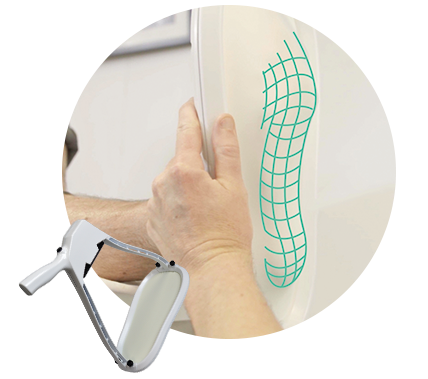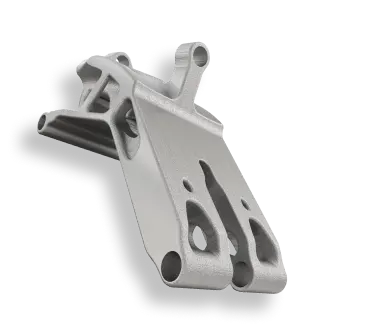A professional 3D printer is a high-precision machine designed for industrial use. It stands out from consumer-grade 3D printers by its ability to produce superior quality objects with high accuracy, using a variety of advanced materials such as resins, metals, and special plastics. These printers are equipped with advanced technologies like FDM, SLS, or DLP, tailored to the specific needs of sectors like aerospace, automotive, medical, etc. They are crucial for businesses that require high-quality, fast, and precise manufacturing. Professional 3D printers also come with specialized software for better integration into production processes.
3D Printers: A Large-Scale Solution to Meet the Challenges of Industry
With over three decades of expertise in the field of professional and industrial 3D printers, Prodways Group supports you in enhancing your production process.
Customization, high precision, cost and waste reduction, choice of materials… The group offers a high-value industrial technological solution that encompasses the entire 3D printing value chain. Increasingly demanding and in search of enhanced performance, the industrial sector is evolving towards a more intelligent and automated production.
Among the technologies developed in the industry, additive manufacturing ranks at the top of the list. And for good reason! It is a valuable technology for businesses, given the advantages it offers compared to more traditional methods.
Professional 3D Printers with Prodways Group
Our industrial 3D printers, featuring multiple technologies, are a testament to performance. By working closely with our internal R&D (research and development) teams and through strategic partnerships, we are committed every day to providing you with cutting-edge equipment coupled with the most suitable materials.
Thanks to a wide selection of applications, products, and materials, our 3D printers meet all the industry’s requirements, thus ensuring optimal productivity and efficiency.
Our Professional 3D Printers

MovingLight(r) DLP 3D Printer

ProMaker P1000 SLS 3D Printers
Prodways Group designs professional 3D printers, each engineered to meet the specific demands of various industrial sectors.
- For professionals in the dental sector, our MOVINGLight® Digital Light Processing DLP technology represents the perfect solution. It ensures the creation of dental parts with remarkable detail and precision.
- Our Selective Laser Sintering (SLS) technology is ideal for creating complex parts with extreme precision. It is suitable for applications requiring high fidelity of shape and dimension.
3D Printers for a Wide Range of Applications and Sectors
Prodways provides businesses, regardless of their industries or fields of activity, with technological solutions to boost their capacity for innovation, production, and to successfully overcome market challenges.
Innovative Materials for Professional 3D Printers
Prodways Group offers a wide range of innovative materials, in close collaboration with its subsidiary Deltamed, which specializes in resins for 3D printing.
Deltamed offers innovative solutions tailored to specific sectors such as dental, jewelry, and audiology. These high-quality resins are designed to meet the precise requirements of these fields, thus offering extensive possibilities for customization and efficiency in production.
Deltamed thus makes a significant contribution to Prodways’ offerings in terms of quality, material diversity, and extends the possibilities offered by 3D printing, by proposing customized solutions to meet the specific needs of each sector.
What is a professional 3D printer?
What are the benefits of using a 3D printer?
Using a 3D printer offers several significant benefits, including:
-
- Speed of Production: 3D printing allows for the rapid creation of parts and prototypes, thus reducing product development timeframes.
- Design Flexibility: This technology provides great freedom in design, enabling the creation of complex shapes that would be difficult or impossible to achieve with traditional methods.
- Cost Reduction: 3D printing can reduce production costs, especially by minimizing material waste and eliminating the need for many expensive tools and molds.
- Customization: It allows for easy customization of objects, which is particularly beneficial for applications such as custom medical prostheses or unique parts.
- Rapid Prototyping: Designers can quickly create, test, and modify prototypes, thereby speeding up the research and development process.
- On-Demand Manufacturing: 3D printing enables the production of objects on demand, reducing the need to store large quantities of finished products.
- Sustainability: By using only the necessary amount of material, 3D printing can contribute to more sustainable manufacturing practices.
These advantages make 3D printing particularly attractive for various industries, including aerospace, automotive, healthcare, education, and many others.
What are the different types of industrial 3D printers?
- FDM (Fused Deposition Modeling): Uses a plastic filament that is melted and deposited layer by layer to build the object.
- SLA (Stereolithography): Employs a laser to cure a liquid resin, layer by layer.
- SLS (Selective Laser Sintering): Uses a laser to fuse powder particles (plastic, metal, ceramic) to create the object.
- DLP (Digital Light Processing): Similar to SLA, this technology uses a digital light source to cure a resin.
- HP’s MJF (Multi Jet Fusion): Projects a fusing agent onto a layer of powder, then fuses it with a heat source.
- EBM (Electron Beam Melting): Fuses metal powder particles using an electron beam.
- 3D Binder Jetting Printers: Spray a binder onto a layer of powder to create the object layer by layer.
- Metal Deposition 3D Printer: Deposits molten metal to construct the object.
- And others …
Each type of industrial 3D printer has its own advantages and is suited to specific applications, offering flexibility and performance tailored to advanced industrial needs.
Why invest in a professional 3D printer?
-
Customization and Flexibility: 3D printers allow for great design freedom, ideal for product customization. You can create unique parts or prototypes quickly and cost-effectively.
-
Cost and Time Reduction: Traditional manufacturing often requires expensive tools and long production times. With 3D printing, you can reduce production costs and speed up the product development process.
-
Innovation and Creativity: 3D printing opens up new possibilities in terms of design and functionality, allowing businesses to innovate and stand out in the market.
-
On-Demand Manufacturing: This technology enables production in small to medium batches or individually without significant extra cost, thereby reducing waste and the need for storage.
-
Rapid Prototyping: The ability to quickly move from design to physical object is invaluable, especially in research and development phases.
In summary, investing in a professional 3D printer can bring considerable added value in terms of innovation, efficiency, and cost reduction, while supporting more sustainable and flexible production.
How to choose your industrial 3D Printer ?
Choosing an industrial 3D printer requires a thorough analysis of several important criteria. Here are some key points to consider:
How much does a professional 3D printer cost?
The price of a professional 3D printer can vary widely based on factors such as the technology it uses, its build size, material compatibility, precision, speed, and additional features. Entry-level professional 3D printers might start around a few thousand dollars, but more advanced models designed for industrial applications can range from tens of thousands to several hundred thousand dollars. High-end systems with the capability to print in metal or other specialized materials can be even more expensive, sometimes reaching into the millions. The cost will ultimately depend on the specific requirements and capabilities needed for your printing projects.
The cost of a professional 3D printer can vary significantly depending on several factors, such as the printing technology used, the size and build volume, the printing precision, the compatible materials, as well as additional features and after-sales services included.
At Prodways Group, we offer industrial 3D printers and 3D printing solutions designed to meet the specific needs of various sectors, including aerospace, medical, dental industry, and many others.
To provide you with the most suitable 3D printing solution for your specific needs and to obtain a personalized estimate, we invite you to get in touch with our sales team. Our experts will be pleased to discuss your requirements, advise you on the available options, and assist you in choosing the most relevant solution for your business.
For more information, please do not hesitate to contact us via our online form.
Our last articles about 3D printing
Would you like to learn more about our professional 3D printers?
Are you interested in our solutions and would like to know more? We kindly ask you to fill out the form below.









